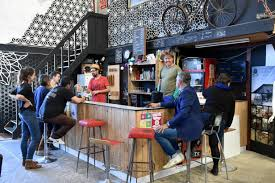Despite the obligation to close and the economic difficulties, the third places and their communities have continued to ensure their role as actors of the living together and of the territorial resilience.
During the containment period, France Tiers-Lieux launched a survey of 1,800 third places to determine the impact of the pandemic on their activities. France Tiers-Lieux 226 third places have responded to this survey.
According to this survey, 90% of the third places that responded to the survey have deployed actions such as the production of medical equipment for people on the front line, supporting educational continuity, digital or social solidarity, grocery deliveries, or food relays...
The third places like fablabs and makerspaces are organized to prototype and manufacture emergency medical equipment: visors, masks, respirators, valves, syringe pumps...
According to the Tiers Lieux association, nearly 400 third places and 30,000 makers have taken their part in making emergency medical equipment for caregivers."
Their production would have exceeded 500,000 pieces per week for the last 2 months, that is to say a total of 4 million units produced, visors, masks, door openers, valves, diving masks transformed into respirators, hydroalcoholic gel, spare parts to repair medical devices... In addition to this, there are hundreds of open source prototypes and models that are easily accessible, improvable and reproducible anywhere in the world: syringe pumps, respirators, etc.
To support this momentum, France Tiers-Lieux, in association with the Fondation de France, has launched an emergency support fund "Makers against Covid-19" for those who bring concrete solutions through prototyping, manufacturing and distribution of medical equipment.
Third-party venues hit hard
"Like all businesses, third places are hit hard by the crisis," reports the association. " They are in a particularly difficult economic situation, because very quickly, it was recommended to all the places to close to avoid any propagation of the virus, and their hybrid nature - mixing commercial activities and non-profit activities - offers them little financial autonomy. Most third places have taken advantage of the measures put in place by the government, but for many of them, these measures will not be sufficient - 80% of third places report a real risk of closure in the short or medium term.Références :





